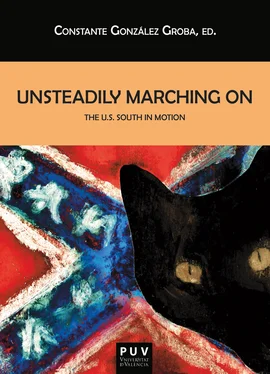1 ...7 8 9 11 12 13 ...21 A final similarity concerns the appearance of a doe – rather, two on this occasion – which function not as guides from the spirit world, as in “Old Man,” but instead as a sacrifice which buys subsequent immunity for Lamb and his island hideaway. Butchered by army officers the does’ carcasses enable Lamb to blackmail the Corps of Engineers cartographers into leaving a blank on the map where his home is, thus lifting it for the receptive reader from the mundane and actual, and endowing it with a mythical atmosphere instead; a suitable location, then, for Newel to discover himself anew.
His rebaptism into confident manhood again takes the form of a repeated immersion in the river. Newel leaves the train south at Memphis and approaches the Mississippi. At the water’s edge he is drawn to the power of the river, realizing his need to form a connection with it: “he had never felt the river, never had it in his hand and let the water comb through his fingers to find out just what it was. It seemed now like a vast and imponderable disadvantage, and made him feel like he needed to know” (Ford 87). Moments later he has dived into the water, not, I would suggest, in a “half-hearted attempt to drown himself” as Martyn Bone argues, but in an attempt to re-vitalize himself, make a new man of himself (Bone 677). Ford offers the detail that Sam’s shorts have come off and “he was floating with his privates adangle in the cold current, prey to any browsing fish” (Ford 88). Though potentially comical, Sam’s skinny-dipping is more akin to a Lawrentian communion with nature. Despite his indecorous entry to the water, “he felt relatively little fear ... and none of the gulping hysteria he feared he might.” The current buoys him as it moves him steadily and “he felt unusually relaxed, though cold and still strange that his parts had become potential forage for the fish” (Ford 88). The prose emphasises the connection between the river and its creatures and Sam’s masculine being. His is a confident masculinity as he “enters” the river for the first time, with all the Freudian undertones that that verb implies. When he is finally hauled ashore by bargemen, he discovers that “some of the numbness was departing his feet, and he was beginning to feel more of a piece” (Ford 91). Like Morrison’s Milkman, Newel is beginning to lose his hypochondria and with it his lameness.
The river test of his masculine health is repeated later on the island, when he stumbles in darkness into the river again. Now there is no-one to haul him out, but he is able to do so with his own efforts. As with Faulkner’s convict, he is accompanied by an animal of some symbolic significance:
He bellied out of the water, and somewhere up the bank he heard the water whacked loudly, and the commotion of something frothing in the water, then the sound of limbs popping and sediment rolling onto the surface, and the lesser noise of some beast wheezing and snorting and trotting into the break. He wondered ... whether some animal had swum the river, and if so, which didn’t seem likely, what could have driven it. He ... thought about Beeb’s theory that animals remained faithful to their own wretched unpromising territory ... “It’s the strongest urge they have,” she said ... “And the stupidest.” (Ford 185)
However, territoriality, or quite simply knowing your home place, is part of the masculine re-definition which Sam Newel seeks, possibly as psychological counterbalance for the boyhood memories of his father’s rootlessness while he pursued his job as travelling salesman. Sam explains to Robard why he has come to this place: “‘It feels like I remember the South being,’ he said. ‘It seemed like a good place’” (Ford 229), and although his renewed appreciation may not last, it is certainly the case that he has taken something positive from his journeys on and in the Mississippi, in contrast to Robard who is fated to die at journey’s end, shot dead by an apparently unmotivated and uncaring country boy, whose rifle casually takes Robard’s life because he “didn’t have no business being here. I’ll tell you that” (Ford 2).
The pattern of river journey, and usually immersion too, as revalidation of masculinity should be fairly clear by now, I hope. So what of the women? Is this a thematic no-go area for them? Lee Smith’s The Last Girls (2002) dares to trespass on male territory, but with rather unconvincing results. The novel logs the reunion of a group of now middle-aged women, who arrange to repeat an adventure of their student days, when they travelled down the Mississippi by raft, in imitation of and homage to Huck Finn’s fantastic voyage. However, their latter-day journey aboard the tourist-oriented riverboat, the Belle of Natchez , lacks any real sense of the river as a significant presence, as it is in the male fiction discussed. Here, it is reduced to a backdrop to those issues of women’s writing that make one wonder at times about the wisdom of écriture feminine : sisterhood within the group of friends; rivalry within the group of friends; husband problems; children problems, lover problems; gynae problems, and so on. The major problem, however, is that the river exerts no worthwhile influence on the women’s lives, but serves only as a reminder of their earlier trip, thus enabling them to review and take stock of their lives in the intervening years. The river gods have departed and those males who remain in the cast of characters are sadly reduced. Harriet, the most sympathetic of the “raft of girls” at least recalls Huck’s description of the Mississippi as a “monstrous big river,” and at least attempts some sort of understanding of the river: “she imagines herself floating farther and farther from shore, borne out into the current on a rising tide of unopposed estrogen.” And therein lies the problem: the women are afloat in a masculine domain and try to feminize it by allowing their womanly issues to dominate. Catherine confesses:
On the original raft trip....She was much more interested in her romance with Howie than she was in the river, or the trip itself. She didn’t give a damn about Mark Twain who reminded her of her uncle Walt anyway.... She was working on her tan. (Smith 188-9)
What Smith does, she does extremely well, so it is perhaps unfair to criticize her portrait of the river overmuch, as it may well reflect accurately the commercialism and consumerism of the contemporary and synthetic Mississippi experience. The “Riverlorian” offers his tourist passengers facts and figures, but fails to conjure any of the mythical force of the river. The Captain of the Belle of Natchez serenades the passengers with “Shrimpboats Are a’Comin’” and “Ol’ Man River” but seems a poor substitute for a Jim Blindso, still less a Mike Fink (Smith 111). The redoubtable Russell, consort to one of the “girls,” retains enough of his masculinity to complain:
This is not real.... Why, a Northern person on this boat ... could travel down the entire Mississippi River and go back home without ever having seen anything of the real South where people live and die and play out their personal dramas just as they do everywhere. (Smith 237)
O tempora, o mores! However, if the contemporary mindset fails to connect with the mystical and defining power of the river, the female mindset – in this novel anyway – lacks sufficient interest to connect with such force, because, I would argue, the river remains the last masculine domain. It is, after all, the “Old Man” and we should jump to accept his rhythms: “Mister M, Mister I, Mister SS I.”
Works Cited
Bone, Martyn. “Review of Richard Ford by Elinor Ann Walker.” Mississippi Quarterly 56 (2003): 675-679.
Brown, Calvin S. A Glossary of Faulkner’s South . New Haven: Yale UP, 1977.
Читать дальше












